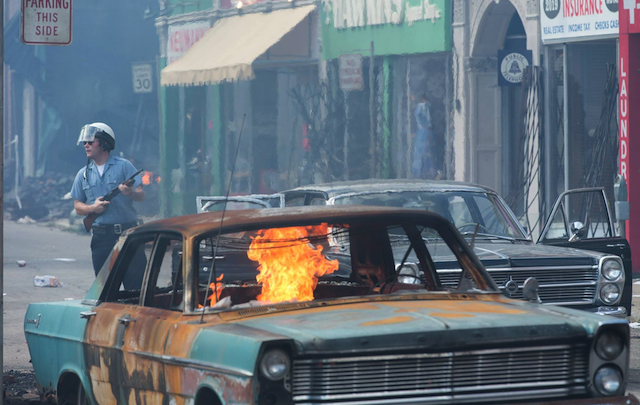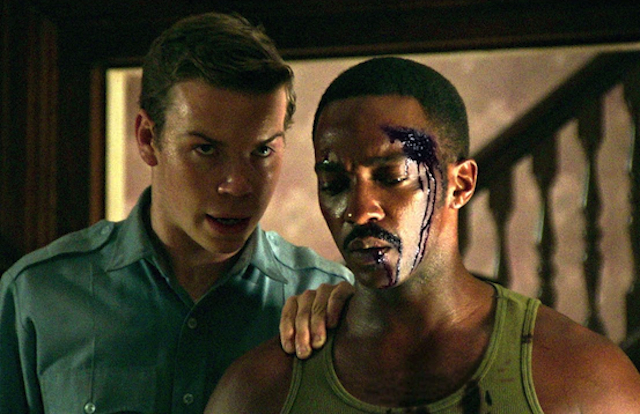CHICAGO – Patrick McDonald of HollywoodChicago.com appears on “The Morning Mess” with Dan Baker on WBGR-FM (Monroe, Wisconsin) on March 21st, 2024, reviewing the new streaming series “Manhunt” – based on the bestseller by James L. Swanson – currently streaming on Apple TV+.
‘Detroit’ is Stark, Blunt & Honest U.S. History
 Rating: 3.5/5.0 |
CHICAGO – It has become clear to anyone who is making an observation about authority and “order” in America, that for certain people it comes with a severe price. “Detroit” explores an incident within the 1967 riots there, when white police officers raided a hotel and perpetuated crimes of their own.
In the 1960s, tensions within the African American communities in major cities had reached a boiling point. Forced into indignity by years of post-slavery Jim Crow laws, the substandard lives offered to people of color began to cause backlash and rioting in desperate urban neighborhoods. The City of Detroit had their long hot summer in 1967, when an unnecessary police raid on an after hours tavern in an all-black enclave caused the city to explode. Within those days of rioting was the Algiers Hotel incident. This incident is the focus of “Detroit,” as director Kathryn Bigelow (“The Hurt Locker”) takes an unblinking look at the police brutality during that brutal time. With Ferguson, Missouri, still heavy on our minds, it seems that everything old is new again.
The Summer of 1967 was a incendiary time in America, especially for civil rights era African Americans. The match hit gasoline when Detroit police raided a “blind pig,” an after hours and unlicensed tavern in the city’s near west side neighborhood. The confrontation escalated to riot proportions, and the mostly white police force of Detroit was overmatched, so the state called in National Guard troops to restore order.

Riots Escalate in July of 1967 in ‘Detroit’
Photo credit: Annapura Distribution
Sniper rumors abounded in the neighborhoods affected by the riots, and the Algiers Hotel became a the target of those rumors. Policemen, led by Officer Krauss (Will Poulter) raided the building, and rounded up anyone they thought might have fired the shots, including a Vietnam veteran named Greene (Anthony Mackie), a Motown singing artist named Fred (Jacob Latimore) and two white women (Hannah Murray and Kaitlyn Dever). The interrogation escalates, and three African American men are shot dead.
Director Bigelow – working from a script by Mark Boal – reconstructs the events with meticulous care. The incident itself was never fully or honestly realized, as the conflicting stories allowed the police an upper hand in the subsequent court trials, but Boal reached out to tell the story through the actual witnesses who were in the hotel, and this film explores the events as they unfolded. The patrons in the building were essentially rounded up and humiliated, with mysterious deaths punctuated by no viable result from the interrogation.
The film is most effective as a reminder of recent history, and how it fits into a continuing pattern. The Detroit police department at the time was 93% white in a 1960s era of segregation, so the understanding between the two races were at its most separate. The tendency for the police to apply “street justice” to innocent and profiled victims was at probably its highest level, and justice for the victims of these confrontations were non-existent. Today, there is more light shed upon the problem, but the result remains the same. If anyone was put in the same situation, it’s highly unlikely they’d be motivated to talk.

Officer Krauss (Will Poulter) Confronts Vietnam Vet Greene (Anthony Mackie) in ‘Detroit’
Photo credit: Annapura Distribution
The film unfortunately stretches the story too broadly, spending an inordinate (and quite brutal) time in the hotel, and less on the trial. The lesson might have benefitted better with the opposite use of focus. There was also a distracting entrance of John Krasinski (“The Office”) towards the end, and his odd cameo mars those scenes. But the whole Algiers Hotel incident is given a flashlight-in-the-dark-corners treatment, deservedly so, for it might have faded into the dustbin of ugly American history.
Benjamin Franklin once said, “Those who would give up Essential Liberty, to purchase a little temporary safety, deserves neither Liberty or Safety.” And that is the real lesson in “Detroit.” As long as our justice system keeps giving away the liberty of the people for a perceived notion that somehow we are “safe,” it facilitates a climate that continues to gather dark clouds.
 |
By PATRICK McDONALD |


